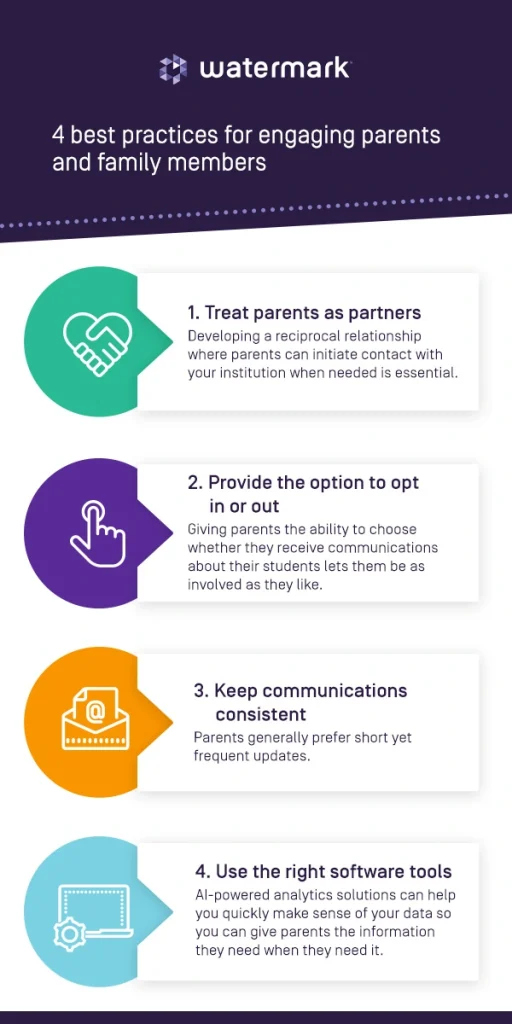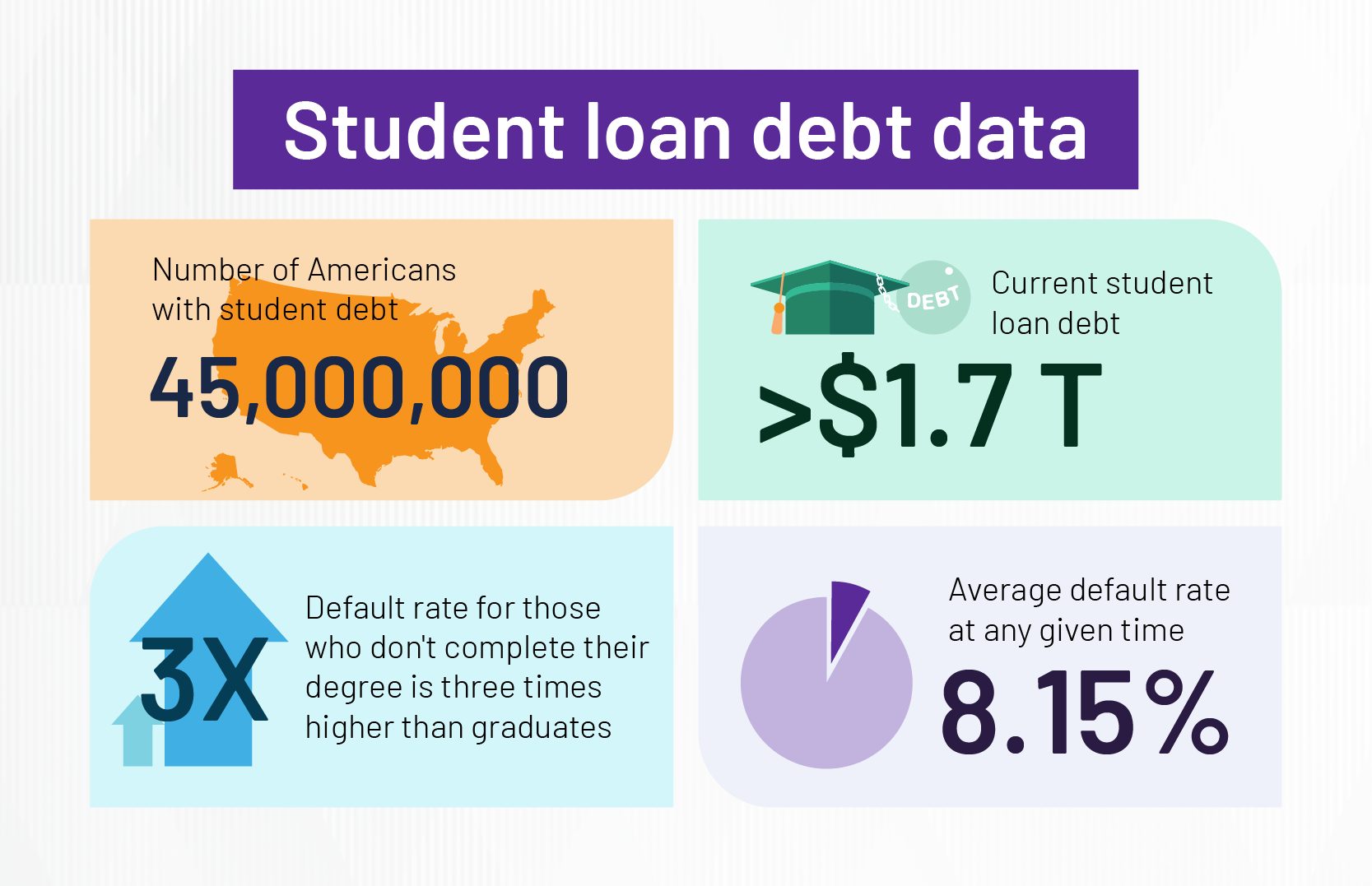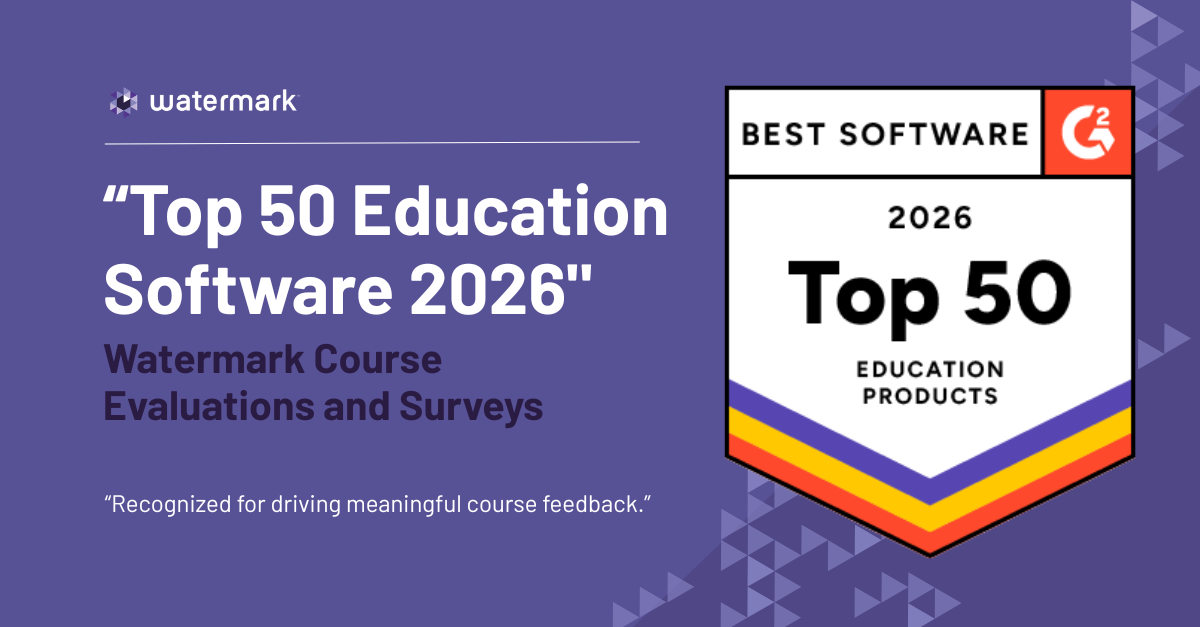
The way parents interact with higher education institutions has changed dramatically over the past decade. Today’s parents want to be actively involved in their children’s education beyond high school.
Throughout primary and secondary school, modern parents had more control over their children’s lives than their parents did over theirs. For example, just consider how many parents drive their children back and forth between extracurricular activities.
This continued engagement is important for maintaining the health of your institution and improving student success rates. And the data you already collect is an essential component in increasing family engagement.
Why is parental engagement important for student success?
The traditional belief about parental engagement is that parents should not be involved in their children’s college education, as continued support from parents could prevent young adults from learning to branch out on their own. College provides an opportunity for students to develop their own identities and belief systems, and too much parental input can limit their ability to truly realize who they are.
However, recent scholars have noted that this theory stems from studies that primarily focused on White male college students in the 1960s and 70s. As the culture has shifted and more students from marginalized groups have enrolled in higher ed, it’s become clear that every student is different — and many students thrive when their parents are actively engaged.
Part of the driving force behind this change is the evolving cultural climate. Compared to the previous generation, today’s parents are much more involved in their children’s lives. Today’s students are accustomed to this involvement — many students lean on their parents well into their college years and beyond for financial, emotional, and career guidance.
Many students also hesitate to rely on their peers for support as a result of the increasingly competitive educational environment. Students vying for admission to top higher education institutions are naturally at odds with one another, and this sense of competition is just as common after enrollment. As a result, the family is the best support system they can turn to.

Essentially, a supportive family provides a sense of security that can give students the confidence they need to begin forging their own paths in life. It also motivates them to do well in their classes and take advantage of the resources available to them so they can be successful after graduation.
Why the conversation around parent involvement has changed
It’s common knowledge that parental involvement in higher education has increased dramatically over the years. While many factors have contributed to this shift, the rising cost of tuition is one of the biggest.
Decades ago, it used to be possible to work a part-time job and pay for college on that income alone. Today, most students lack the financial means to afford tuition without help. That help often comes in the form of contributions from their parents — parents paid 40 percent of college costs in 2023 using their income and savings.
Parents now see higher education as a major family investment, and they need to feel confident that their investment is worth the money. Schools need to provide hard evidence of their value throughout the student’s educational journey if they want to keep these parents satisfied.
Benefits of improving parental engagement in schools
Although our society encourages young people to be hyper-independent, parents often continue to play an active role in their children’s lives after they enroll in higher education. And it’s a better arrangement than many may believe.
When students feel as though they have a safe place to return to, they’re more likely to take risks and learn from their mistakes — which is critical for their growth as individuals.
Some of the other benefits of continued parent involvement include:
- Enrollment yield: Parents play a big role in helping students decide which institution to attend, often limiting a student’s choice based on budget or prestige. As a result, institutions that can appeal to parents early on are more likely to improve their enrollment yield year over year.
- Funding: Parents who are satisfied with their children’s education often develop an affinity for the school and are more likely to donate after graduation.
- Student retention: When students know they have a strong support system at home, they’re more likely to overcome challenges and complete their education. Encouraging parents to stay involved in each student’s academic life can significantly improve graduation rates, student satisfaction, and more.
If your institution wants to improve student success rates, family engagement is more than a nice-to-have — it’s a necessity. Fortunately, you already have the tools you need at your disposal.
How to use data to improve parental engagement in higher ed
The benefits of data-driven decision-making aren’t limited to higher education administrators. When parents have access to institutional data, they have what they need to make the most informed decisions regarding their students.
Following these tips can help you better engage parents in your institution:
1. Understand what parents want to know
Parents and students have different needs when it comes to staying informed, and failing to differentiate between the two can cause parents to disengage. Asking parents to fill out a questionnaire can reveal what data you’ll need to focus on to keep them engaged.

Some of the most common information parents want access to includes:
- Academic performance: Keeping parents informed of a student’s grades and academic progress helps them hold their children accountable.
- Accommodations for disabilities: Parents of students with disabilities want to ensure the institution offers accommodations that will set their children up for the best chance of success.
- Athletic standing: Parents of student-athletes often like to ensure their student is in good standing with the institution to maintain their spot on the team.
- Scholarship and financial aid status: Since budget is such a major concern for families of college students, keeping them informed can help catch students who may be at risk of losing aid.
- Career outlooks: How do students in specific programs typically fare after graduation? Labor market data can help parents feel more confident in their student’s program.
It’s important to consider how the Family Educational Rights and Privacy Act of 1974 (FERPA) plays into this situation. Students typically gain the right to control who has access to their information when they begin higher education, and institutions often need to gain written consent to disclose that data to parents.
Institutions need to be careful when navigating FERPA compliance, as it has the potential to cause or intensify existing tensions between students and their parents. That’s why it’s critical to inform parents and eligible students of their rights under FERPA before they enroll at your institution — this advance notice ensures everyone understands the law from the start.
2. Use your institution’s website
Your institution’s website is the first point of contact for most families, and it remains a crucial resource until graduation. That’s why many institutions have launched web portals specifically designed to help parents and family members stay informed about campus news, student status updates, and academic performance.
Advanced data analytics tools can help make your institution’s website more useful to parents. The software can analyze student data to generate valuable insights into each student’s educational journey. A streamlined dashboard complete with rich visualizations makes these insights easy to interpret and understand, so parents can stay in the loop without needing to ask for clarification.
Customization capabilities enable parents to arrange the portal in a way that makes the most sense to them. For example, if they frequently check their student’s account balance but rarely view the campus events page, they can adjust the portal settings so they see the most relevant pages first.
3. Create a personalized communications strategy
Personalization is everywhere today. According to McKinsey market research, 71 percent of consumers expect personalized service from companies when they make a purchase. They expect companies to remember their names, preferences, and other details from previous interactions. AI and other advanced analytics software enable companies to extract this information from their customer data,
That expectation extends beyond the retail world into higher education marketing — students and parents expect institutions to deliver impactful personalization in their communications throughout the educational journey. Parents also expect that institutions will communicate with them directly rather than through their students. The problem is that most institutions still default to copying nameless parents on occasional student communications.
Data analytics tools can also aid higher ed marketing and communications professionals in customizing messages by generating insights about each student based on the data you already have. For example, at-risk students will require more urgent messaging than high achievers, and expressing this urgency to parents can help them get their students back on track.
4 best practices for engaging parents and family members
Although advanced data analytics software is essential for effectively reporting student learning to parents, you need to implement it correctly to ensure you get the results you want.
Flexibility, transparency, and respect are key concepts to consider when planning how you will interact with families moving forward. Here are four tips for creating an effective parent engagement strategy:

1. Treat parents as partners
Although they will be less involved than they were in high school, parents of college students still want to know their voices are heard. Developing a reciprocal relationship where parents can initiate contact with your institution when needed is essential.
Although you won’t be able to accommodate all their requests, you can still keep them engaged by listening to their concerns. Providing a simple contact form or directory in your parent and family portal can help parents get in touch with the right people directly.
2. Provide the option to opt in or out
While many parents want to be very involved in their student’s education, some prefer to step out of the way and give their children space. These parents may prefer not to receive updates, as they may want to avoid infringing on their student’s privacy.
Giving parents the ability to choose whether they receive communications about their students lets them be as involved as they like. You can also offer customizable communication preferences so parents can choose which specific information they receive and where.
For example, an email preferences list would enable parents to opt out of receiving emails about campus events without losing access to student progress updates.
3. Keep communications consistent
Parents generally prefer short yet frequent updates — according to one study of 21,860 prospective and current families, 85 percent of respondents said they want weekly communications from their student’s institution. In a parent questionnaire, you can gather information about the frequency of communications and use that data to devise a strategy.
Whatever schedule you set for communications, it’s important to stay consistent. Regular updates help your institution appear more transparent, which can enhance your reputation as a trustworthy school.
Consistent communication also helps maintain high engagement levels by reminding parents of your institution’s presence. Parents can check on their students and see how your institution is committed to preparing them for a successful future.
4. Use the right software tools
As with any other area of your institution, the proper technology is essential for getting the results you want. AI-powered analytics solutions can help you quickly make sense of your data so you can give parents the information they need when they need it.
It’s important to carefully evaluate your options before adding another software solution to your tech stack. Ideally, you’ll want to choose a tool that integrates with the other programs your institution uses so you can share data across your ecosystem.
Compatibility with other edtech tools can also help you cut costs by streamlining your tech stack to only include the essentials. Removing redundant software from your ecosystem also eliminates confusion and improves accuracy by breaking down departmental data silos and opening up space in your system.
A unified, cloud-based analytics software suite eliminates the need to enter data multiple times, so you can get more accurate insights in a fraction of the time it would take with standard solutions. And greater efficiency means you can commit to a regular communications schedule.
Watermark can help you boost parental engagement in education
The most important takeaway here is that helping parents stay involved in their student’s educational journey is essential for success. It can also benefit your institution by giving parents a reason to support you financially.
At Watermark, we’re dedicated to helping higher education institutions make the most of their data. Our user-friendly analytics software provides a centralized hub for all your student, faculty, and assessment data, streamlining access and analysis for easy reporting.
Plus, full integrations between every Watermark solution and leading student data systems create a seamless flow of data across your entire ecosystem. With a single source of truth for all your institution’s data, you can have peace of mind knowing you’re always using the most recent and accurate information available.
See how partnering with Watermark can push your institution to new heights. Contact us today to request a personalized demo of any of our software solutions.

















































































































































































































































































































































































































